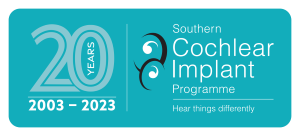- Copies of early hearing test results
- Details of hearing aids
- History of the hearing loss
- Other medical reports
Once a referral has been received from an ENT Specialist or Audiologist the patient is assessed by the Southern Cochlear Implant Programme (SCIP) team.
Pre-assessment
Before an assessment, information will have been requested from the local professionals already involved in your care. This may include:
The time required to carry out the assessment is listed below but is an estimate only.
Audiology Assessment (2-3 hours)
The main goal of the pre-operative assessment process is to determine that a cochlear implant is the best option. In general, if it is felt that a cochlear implant could provide more benefit to a patient than their current hearing aid (s) or residual hearing, then they are considered for an implant.
The Audiology assessment involves:
- A full history
- A check of existing hearing aids
- Unaided hearing testing
- Aided hearing testing
- Aide speech perception
Depending on the results of testing the Audiologist may recommend a review of your current hearing aids by your own Audiologist.
The Audiology assessment will determine if a cochlear implant will provide you more benefit than conventional hearing aids.
Rehabilitation Assessment (1 1/2 hours)
A rehabilitation assessment considers
- Your current listening and listening needs
- Expectations about the outcomes for a cochlear implant
The rehabilitation appointment is also an opportunity to look at a cochlear implant device and so be familiar with its operation.
ENT assessment (30 minutes)
The initial meeting with the ENT surgeon usually occurs after the Audiology and Rehabilitation assessments. The ENT assessment involves discussion about:
- Your medical case history
- medical issues surrounding imaging (such as MRI and CT)
- referral for MRI and/or CT
- the nature of the procedure
- the risks of the surgical procedure
- likely outcomes
Once it is determined that a patient is or may be a suitable candidate, Magnetic Resonance Imaging (MRI) and Computer Tomography (CT) scans are done to determines a person’s medical suitability for implant surgery.
Scans
Once it is determined that a patient is or may be a suitable candidate, Magnetic Resonance Imaging (MRI) and Computer Tomography (CT) scans are done to determines a person’s medical suitability for implant surgery, The scans may be completed at St George’s hospital.
Summary and Information (1 hour)
At the end of the assessment process the SCIP team will make a recommendation about a cochlear implant for you. If the recommendation is to proceed, you will be provided information about implant systems and the process of implantation and follow-up.
You may be asked to complete an expectations questionnaire. The programme will likely provide an opportunity for you to meet another cochlear implant user.
For adults there may be a significant wait for funding, depending on clinical priority.

